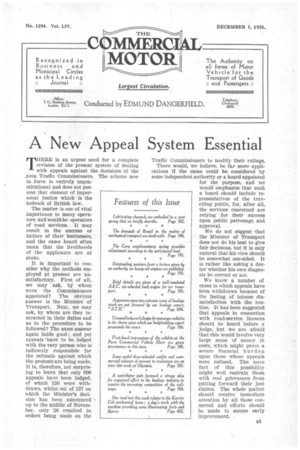A New Appeal System Essential
Page 35

If you've noticed an error in this article please click here to report it so we can fix it.
THERE is an urgent needfor a complete revision of the present system of dealing with appeals against the decisions of the Area Traffic Commissioners. The scheme now in force is entirely uncon stitutional and does not pos sess that element of imper sonal justice which is the bedrock of British law.
The matter is one of vital importance to many operators and would-be operators of road services. it may result in the success or failure of theirbusinesses, and the cases heard often mean that the livelihoods of the applicants are at stake.
It is important to consider why the methods employed at present are unsatisfactory. First of all, we may ask, by whom were the Commissioners appointed? The obvious answer is the Minister of Transport. Next, we may ask, by whom are they instructed in their duties and as to the procedure to be followed? The same answer again holds good ; and yet appeals 'have to be lodged with the very person who is indirectly responsible for the refusals against which the protests are being made. It is, therefore, not surprising to learn that only 500 appeals have been lodged, of which 130 were withdrawn, whilst out of 137 on which the Minister's decision has been announced up to the middle of November, only 26 resulted in orders being made on the Traffic Commissioners to modify their rulings. There would, we believe, be far more applications if the cases could be considered by some independent authority or a board appointed for the purpose, and we would emphasize that such a board should include re presentatives of the travelling public, for, after all, the services concerned are relying for their success upon public patronage and approval.
We do not suggest that the Minister of Transport does not do his best to give fair decisions, but it is only natural that his view should be somewhat one-sided. It is rather like asking a doctor whether his own diagnosis be correct or not.
We know a number of cases in which appeals have been withdrawn because of the feeling of intense dissatisfaction with the routine. It has been suggested that appeals in connection with road-service licences should be heard before a judge, but we are afraid that this would involve very large sums of money in costs, which might prove a severe financial burden upon those whose appeals were refused. The mere fact of this possibility might well restrain those with real grievances from putting forward their just claims. The whole matter should receive immediate attention by all those concerned and efforts should be made to secure early improvement.
























































































